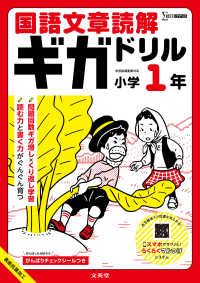- ホーム
- > 洋書
- > 英文書
- > History / World
Full Description
Historians have long understood that the notion of "the cold war" is richly metaphorical, if not paradoxical. The conflict between the United States and the Soviet Union was a war that fell ambiguously short of war, an armed truce that produced considerable bloodshed. Yet scholars in the rapidly expanding field of Cold War studies have seldom paused to consider the conceptual and chronological foundations of the idea of the Cold War itself. This stands in contrast to the study of other historical epochs that are governed by grand but ambivalent rubrics: the Renaissance, the Scientific Revolution, or the Industrial Revolution. In Uncertain Empire, a group of leading scholars takes up the challenge of making sense of the idea of the Cold War and its application to the writing of American history. They interrogate the concept from a wide range of disciplinary vantage points; the scope of these different positions illustrates the diversity of methods and approaches in contemporary Cold War studies. Among the disciplines on which the book draws are diplomatic history, the history of science, literary criticism, cultural history, and the history of religion.
Animating the volume as a whole is a question about the extent to which the Cold War was an American invention. Essays look at the Cold War as in need of a rigorous re-centering, after a decade in which historians have introduced expansive global and transnational perspectives on the conflict; as a uniquely American ideological project designed to legitimize the pursuit of an ambitious geopolitical agenda; as a geopolitical and transnational phenomenon; and other approaches. Uncertain Empire brings these debates into focus, and offers students of the Cold War a new framework for considering recent developments in the scholarship.
Contents
Introduction, Joel Isaac and Duncan Bell ; Part I: Prisms ; 1. Cold War Degree Zero, Anders Stephanson ; 2. Exploring the Histories of the Cold War: A Pluralist Approach, Odd Arne Westad ; 3. A History Best Served Cold, Philip Mirowski ; 4. Inventing Other Realities: What the Cold War Means for Literary Studies, Steven Belletto ; Part II: Vistas ; 5. The Geopolitical Vision: The Myth of an Outmatched U.S.A., John Thompson ; 6. War Envy and Amnesia: American Cold War Rewrites of Russia's War, Ann Douglas ; 7. The Spirit of Democracy: Religious Liberty and American Anti-Communism during the Cold War, Andrew Preston ; 8. God, the Bomb, and the Cold War: The Religious and Ethical Debate Over Nuclear Weapons, 1945-1960, Paul S. Boyer ; 9. Blues Under Siege: Ralph Ellison, Albert Murray, and the Idea of America, Daniel Matlin ; 10. Cold War Culture and the Lingering Myth of Sacco and Vanzetti, Moshik Temkin ; 11. Deconstructing "Cold War Anthropology", Peter Mandler ; 12. Cognitive and Perceptual Training in the Cold War Man-Machine System, Sharon Ghamari-Tabrizi ; Index








